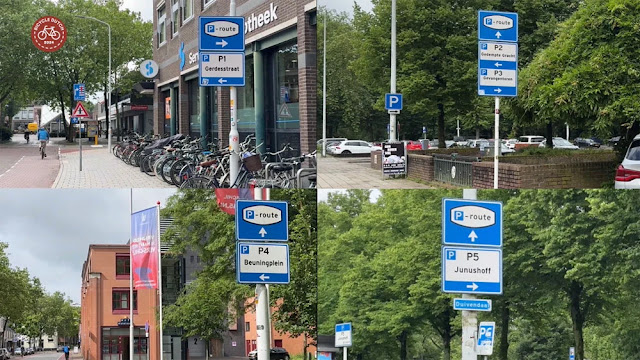The Netherlands is often seen as a cyclists' paradise. Indeed, the country's ratio of bicycles to people is roughly the same as, ahem, of that of guns to people in the United States. (That is to say, humans are outnumbered.) And comprehensive networks of bike lanes that you can actually use to get from home to school or work, or to go shopping or simply on a "fun" ride, crisscross many Dutch cities and towns. Moreover, bicycle "infrastructure" includes facilities like parking garages that drivers take for granted.
However, even in such a velocipedic utopia, not all places are "bike friendly," according to Mark Wagenbuur, the "Bicycle Dutch" blog author. Recently, he was asked to speak in Wageningen, a small city with a university renowned for its work in agricultural technology and engineering. As he had never before been in the city, he spent some time pedaling in it before offering his perspective on its cycling conditions.
There, he reports, he found "a mishmash of various types of infrastructure that have developed over time." Not only did he find paths with different kinds of surfaces that weren't connected, he also found bike lanes where they "didn't need to be," like the one alongside a residential street with a 30 kph (19 mph) speed limit. To be fair, he points out, the street was once a major road, so the bike lane may have made more sense. But, as with any kind of infrastructure, it needs to be updated.
Also, he found "car parking lots galore" in a city that is "warmly welcoming car drivers" and noticed that, like other cities that aren't particularly welcoming to cyclists, it's also difficult to reach and navigate via mass transit. (Though there is a bus terminal, the nearest rail station is 8 km--about 5 miles--from the center of the city.) Furthermore, the pedestrian route from the bus station to the center of town includes crossing a busy Provincial Road with no crosswalk or traffic lights. From there, pedestrians traverse a dark underpass and a car parking lot.
Americans (and people in some other countries) might dismiss Wagenbuur as "spoiled." After all, he is comparing conditions in Wageningen to those of his home city and others in the Netherlands. But he has made a valid point: Wageningen can, and should do better, even if its cycling conditions are better than those of most locales in the United States.


